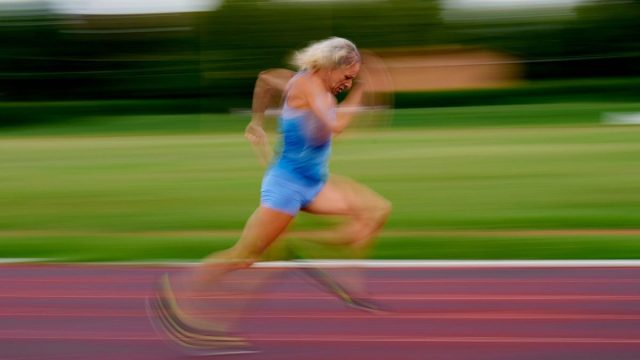Despite the controversy and accusations of unfair advantage, Petrillo will compete in Paris in the T12 classification for visually impaired athletes.
Valentina Petrillo fell in love with athletics at the age of seven, when she saw the Italian sprinter Pietro Mennea win gold in the 200 meters at the Olympics Moscow 1980.
“He said he wanted to be like him,” says Petrillo, who was born male. “I wanted to wear the blue shirt (of Italy), I wanted to go to the Olympic Games. But she wanted to do it as a woman because I didn’t feel like a man, I didn’t feel like myself.”
Four decades later, at 50 years old, Petrillo is about to make his dream come true, but not in the Olympic Games. She will become the first woman transgender that competes in the Paralympic Games when he runs the 200 and 400 meters in the T12 classification for visually impaired athletes in Paris.
Petrillo’s trip to the Paralympic Games
Petrillo, who was diagnosed as a teenager with Stargardt diseasea degenerative eye condition, considers herself lucky despite the challenges she has faced.
He has lived most of his life as a man and alone He came out as transgender to his wife – with whom he has a son – in 2017. before starting hormone therapy two years later.
“In January 2019 I began the transition process and In 2020 I achieved my dreamwhich was to compete in the female category to practice the sport that I have always liked,” she explains in an interview on a track where she trains in a neighborhood of Bologna, where she lives.
She ran her first race as a woman in 2020 and finished fifth in the European Para Athletics Championships. Last year she won the bronze medal in the 200 and 400 meters at the World Para Athletics Championships.
Transgender regulations in athletics
The World Athletics Association last year banned transgender women from competing in the women’s category in international events if they transitioned after puberty. But its counterpart, the World Para Athletics Association (WPA), has not done the same.
In a statement sent to the AP, the WPA states that transgender athletes in its women’s competitions must declare that their gender identity for sporting purposes is female, and prove that your testosterone levels have been below 10 nanomoles per liter of blood for at least 12 months before your first competition.
Testosterone is a natural hormone that increases bone and muscle mass and strength after puberty. The normal range in adult men rises to about 30 nmol per liter of blood, compared to less than 2 nmol/L in women.
“Any future changes to the WPA rules position in this area will only be considered in consultation with the teams and athletes, and taking into account the rights and best interests of all involved“said the association.
In a sport that is already grappling with how to create a level playing field among athletes with different levels of disabilities, some of Petrillo’s competitors say she has an unfair advantage.
Last year there was a violent reaction against Petrillo in Spain, after he narrowly beat Spanish athlete Melani Berges and was fourth in the semi-final of the world championshipswhich meant that Berges did not qualify for the final and lost the opportunity to participate in the Paralympic Games.
Berges called it “injustice,” telling the Spanish sports website Relevo that, although he “accepts and respects” transsexual people, “he already we are not talking about everyday lifebut of sport, which requires strength, a physique”.
The Spanish Paralympic Committee told the AP that its position had not changed since last year, when a spokesperson told Spanish media that “we respect the regulations of World Para Athletics, which currently allow trans women to compete, as is the case of Valentina Petrillo, but, looking to the future, we believe that it would be convenient move towards uniformity of criteria with the Olympic world in relation to this matter.”
Petrillo said he understands to a certain extent those who They question whether they should compete in the female category.
Petrillo referred to a study funded by the IOC – and published in April in the ‘British Journal of Sports Medicine’ – which showed that transsexual women were actually at a physical disadvantage compared to cisgender women in several areas, such as lung function and lower body strength.
Petrillo’s defense of transgender rights
In the Paralympic Games, the finals of the Women’s 400 and 200 meter dash They will take place on September 3 and 7, respectively. Petrillo will be encouraged by his nine-year-old son, his brother and his ex-wife.
However, the sprinter claims that she has already won her biggest challenge, no matter what happens when she takes to the track at the Stade de France.
“Unfortunately, we continue to live in a situation where women are marginalized transsexual peoplethat they will never be able to change a document like I did, that they will never be able to get what they deserve, the respect they deserve,” declared Petrillo. “And for that, my thoughts go to them, to those who have been less fortunate than me.” .
“From now on I would like to hear beautiful stories of transsexuals, of people with disabilities, from all over the world. And my hope is that from my story they can find the inspiration and strength to believe that a different tomorrow It’s possible.”






